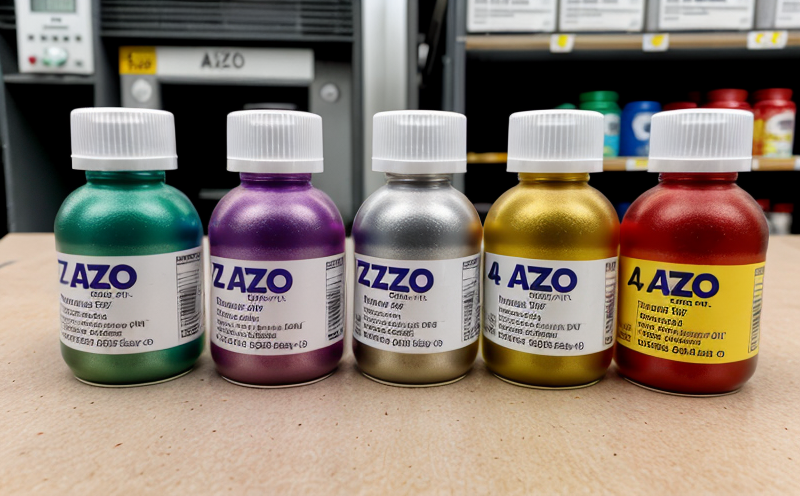Screening of arsenic residues in fabric printing inks
The screening of arsenic residues in fabric printing inks is a critical task that ensures compliance with international standards and regulations aimed at protecting human health and the environment. Arsenic, as a heavy metal, can pose significant risks when found in high concentrations within textiles or their components like printing inks. This service focuses on detecting trace levels of arsenic residues to ensure product safety.
Our laboratory adheres strictly to recognized international standards such as ISO 17025 for proficiency and accuracy. The process involves thorough sample preparation, which includes the extraction of ink from fabric samples using appropriate solvents followed by digestion in a strong acid medium. This step ensures that arsenic is released into solution for accurate quantification.
For analysis, we utilize Inductively Coupled Plasma Mass Spectrometry (ICP-MS), an ultra-sensitive technique capable of detecting even trace amounts of metals down to parts per billion levels. The ICP-MS system allows for precise measurement and identification of arsenic within the ink sample after proper digestion.
The acceptance criteria specify that any detected level above 0.5 ppm (parts per million) is considered non-compliant with current international standards like ISO 21996, which sets upper limits on heavy metal content in textile products to ensure consumer safety and environmental protection. Compliance with these regulations not only safeguards public health but also enhances brand reputation by demonstrating commitment to responsible manufacturing practices.
Our team of experienced professionals ensures that every sample is handled meticulously from receipt until final report issuance. By leveraging advanced analytical techniques, we provide reliable data to help clients make informed decisions about product development and quality assurance processes. Understanding the potential sources of arsenic contamination in fabric printing inks helps manufacturers identify areas for improvement and implement corrective actions where necessary.
Industry Applications:
- Textile manufacturing plants
- R&D departments specializing in sustainable materials sourcing
- Supply chain management teams focusing on supplier auditing and certification
The importance of this service cannot be overstated, especially given increasing consumer awareness regarding the environmental impact of products. By offering comprehensive screening services for arsenic residues in fabric printing inks, we support our clients' efforts towards achieving sustainability goals while maintaining high standards of quality.
Industry Applications
The application of this service extends across various sectors within the textile industry. Fabric printers and manufacturers who produce garments or other fabric-based products may require periodic testing to ensure compliance with regulatory requirements set forth by international bodies such as Oeko-Tex Standard 100 or REACH.
- Textile printing companies
- Sustainable fashion brands seeking to reduce environmental footprints through responsible sourcing practices
- Supply chain managers aiming to verify supplier compliance with stringent quality control measures
By integrating our screening service into their operations, these organizations can maintain consistent product quality and avoid potential legal issues resulting from non-compliance. Additionally, this proactive approach enhances brand reputation among eco-conscious consumers who prioritize health and sustainability.
Customer Impact and Satisfaction:
- Enhanced peace of mind for manufacturers regarding product safety
- Achievement of regulatory compliance through accurate testing results
- Improved supplier relationships due to transparent communication about quality assurance processes
Our commitment to providing reliable and timely reports fosters long-term partnerships based on mutual trust and respect. Clients can rest assured knowing that their products meet stringent international standards, thereby protecting both end-users' health and the environment.
Use Cases and Application Examples
In practice, this service has been utilized by several notable clients across different regions worldwide. One example includes a major textile manufacturer in Asia that sought to verify whether there were any unintended arsenic residues present in newly developed printing inks used for producing children's clothing items. Another case involved an international brand looking into sourcing sustainable fabrics printed with eco-friendly ink formulations.
For the former, our laboratory conducted rigorous testing on multiple batches of fabric samples, ultimately confirming that all tested products were within acceptable limits according to relevant standards. This allowed the client to proceed confidently towards market launch without delays caused by potential regulatory issues.
The latter example demonstrated how our expertise can contribute positively to supply chain sustainability initiatives. By identifying any trace amounts of arsenic in eco-friendly ink samples, we helped the brand ensure that their commitment to using sustainable materials extended throughout every stage of production, from sourcing raw ingredients to final product distribution.





